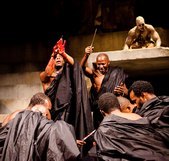SITE GUIDE
SEARCH
REVIEWS
REVIEW ARCHIVES
ADVERTISING AT CURTAINUP
FEATURES
NEWS
Etcetera and
Short Term Listings
LISTINGS
Broadway
Off-Broadway
NYC Restaurants
BOOKS and CDs
OTHER PLACES
Berkshires
London
California
New Jersey
DC
Connecticut
Philadelphia
Elsewhere
QUOTES
TKTS
PLAYWRIGHTS' ALBUMS
LETTERS TO EDITOR
FILM
LINKS
MISCELLANEOUS
Free Updates
Masthead
Writing for Us
A CurtainUp  London Review
London Review
 London Review
London ReviewJulius Caesar
|
The abuse of greatness is when it disjoins remorse from power.
— Brutus
|

The conspirators (Photo: Kwame Lestrade) |
Paterson Joseph leads in the complex role of Brutus “the noblest Roman of them all,” a posthumous tribute, delivered by his opponent Mark Antony played by an athletic Ray Fearon. Jeffrey Kissoon as the egocentric Julius Caesar is the horsetail fly switch wielding benevolent dictator, prone to flattery and admiration from the mob.
The play opens with the African marketplace and traders creating an air of activity and anticipation. Designer Michael Vale gives us ancient stone steps and to go to the Senate on the fateful Ides of March, black togas and gold watches for the senators. Dominating the rear of the stage is a giant statue of Caesar only seen in part and ready to tumble like those of dictators after their downfall. The Soothsayer (Theo Ogundipe) is a witch doctor and Casca’s speeches about the omens during the thunderstorm which precedes the murder are believable, especially the one about meeting a lion which in Africa is to be expected!
The production in Stratford, a couple of months ago, ran through without an interval, but in the West End an interval has been inserted immediately after the death of Caesar on the steps, but before Brutus explains why the Roman republic is more important than any individual and in reply Caesar’s blood drenched gown is held up by Mark Antony for the knife slashes to be examined by the crowd.
Antony’s funeral orations are examples of the art of rhetoric as the crowd are swayed by the younger athlete who topically in his first scene comes in wearing on a ribbon something that could have been a pair of Olympic medals. It is as a result of Antony’s speech that the conspirators are forced to flee Rome.
Julius Caesar is all about choices and the greater good. Caesar’s being offered the crown is a danger to the political system the Senators want to defend. Brutus reminds us that he was “born free” which has special resonance for Africans throwing off the chains of colonialism. The conspirators are of course proved right because what comes after Julius Caesar’s death is the reign of strong, autocratic emperors, starting with Augustus’ bloodline (Octavius Caesar here played by Ivanno Jeremiah) through Tiberius to Caligula and Nero, cruel hereditary emperors who would have given those defenders of the republic, Brutus, Cassius and Mark Antony nightmares.
What makes Doran’s production exciting is not just the African context but the outstanding performance of Paterson Joseph as Brutus. He has an unusual look, his eyes haunted and conveying an intellectual and emotional range other actors can only dream of. Those battle speeches before Philippi have real drama through the agonised thoughts of Brutus as he sees the ghost of Caesar after the suicide of Cassius (Cyril Nri).
Jeffrey Kissoon nicely parodies the self aggrandising, about to be dictator, with an oily smooth persona encouraging the mob to applaud him and the result of his murder is that we the audience lose lose a magnificent stage presence. Ray Fearon’s Antony has us questioning his adulation of the older man in a performance which convinces us from the outset that Antony is a clever politician. Joseph Mydell seethes as the envious Casca and Ewart James Walters adds gravitas as elder statesmen.
This superb production of Julius Caesar is a part of the World Shakespeare Festival 2012, Shakespeare is a global phenomenon, taught in schools worldwide, and convinces that Gregory Doran is the right choice at the helm of the Royal Shakespeare Company empire.
|
Subscribe to our FREE email updates with a note from editor Elyse Sommer about additions to the website -- with main page hot links to the latest features posted at our numerous locations. To subscribe,
E-mail: esommer@curtainup.comesommer@curtainup.com
put SUBSCRIBE CURTAINUP EMAIL UPDATE in the subject line and your full name and email address in the body of the message -- if you can spare a minute, tell us how you came to CurtainUp and from what part of the country. |
| Julius Caesar
Written by William Shakespeare Directed by Gregory Doran Starring: Jeffrey Kissoon, Paterson Joseph, Cyril Nri, Ewart James Walters, Ray Fearon, Joseph Mydell With: Ann Ogbomo, Adjoa Andoh, Andrew French, Chinna Wodu, Mark Theodore, Segun Akinbola, Ivanno Jeremiah, Ricky Fearon, Marcus Griffiths, Theo Ogundipe, Mark Ebulue, Jude Owusu, Marcus Griffiths, Simon Manyonda Design: Michael Vale Lighting: Vince Herbert Music: Akintayo Akinbode Sound: Jonathan Ruddick Movement: Diane Alison-Mitchell Fights: Kevin McCurdy Running time: Two hours 35 minutes including an interval Box Office: 0844 482 5141 Website: www.rsc.org.uk Booking in London to 15th September 2012 and then touring to 27th October Aylesbury Waterside Theatre 19-22 September Bradford Alhambra Theatre 25-29 September Salford The Lowry 2-6 October 2012 Norwich Theatre Royal 16-20 October Cardiff New Theatre 23-27 October Reviewed by Lizzie Loveridge based on 15th August 2012 performance at Noel Coward Theatre, St Martin’s Lane, London WC2N 4AU (Tube: Leicester Square) |
|
REVIEW FEEDBACK Highlight one of the responses below and click "copy" or"CTRL+C"
Paste the highlighted text into the subject line (CTRL+ V): Feel free to add detailed comments in the body of the email . . . also the names and emails of any friends to whom you'd like us to forward a copy of this review. |




